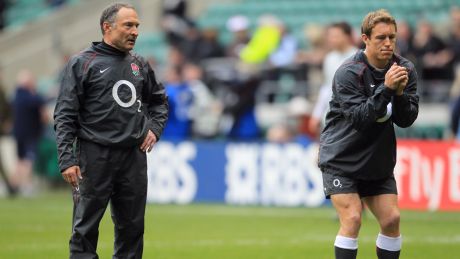The Pressure Professor
Dr Dave Alred MBE, a rugby kicking coach who Jonny Wilkinson calls “the best in the world”, on keeping a cool head

What made you want to study pressure?
When I played rugby, I was always fascinated as to why sometimes you’d get up and feel great, kicking eight goals out of eight, and you could come in the next day and find it really difficult. You’d end up unpicking things which should be part of your procedural memory, and suddenly thinking about things you normally don’t have to think about at all.
Where does pressure come from?
Fear of not achieving the outcome you want. That fear can distract you from the process of improving. The first stage of anyone’s improvement is improving on themselves. With competition we tend to neglect that and try to benchmark against others, but it’s always about getting better – if you kicked eight goals last time and ten this time, it doesn’t matter who kicked 15.
So it’s placed on ourselves rather than from outside?
I was a schoolteacher before going into elite coaching, and worked out that one of the biggest blocks to a child committing themselves to anything – academic work, PE, whatever – was their self-image. Watch a five-year-old trying to hit a golf ball. They’ll swing and miss, and swing and miss, and swing and miss and finally hit one, and they’re riveted with excitement. They’ve done it, they’re a golfer! The adult side of us goes “one in four?” but the child isn’t interested in failure, he’s interested in achieving. As adults we spend all our time reinforcing what we can’t do, and I’m trying to readdress that.
When working with someone, how do you know it’s going to work?
The skill is to get them to go with you and go, “Yeah, show me what I can do”. That was what made working with Jonny Wilkinson so special. When I first met him I showed him what he could do [Alred famously dazzled Wilkinson with a perfect spiral kick, as detailed in Wilkinson’s autobiography] and he went, “Wow, let’s do it!” He’d been reluctant initially, going “Why should I go and see this guy? I know how to kick!” But I showed him and the rest, as they say, is history.
Did you feel a lot of pressure at the World Cup final in 2003?
All during the game, even when it went into overtime, I still felt we were going to win. I can’t tell you why. We made mistakes and didn’t play particularly well, but there were moments like Jason Robinson’s kick into touch when they didn’t know he could do it, and Mike Tindall’s long kick down to the endzone that was one of the best kicks of his career, that just made victory seem inevitable from where we were.
And you worked with Wilkinson until his retirement, right?
He had such a burning desire to improve, and there were several big knockbacks around knee injuries that meant we had to change everything in terms of kicking. We had a meeting in Bath, and he was hobbling along with a swollen knee and stitch marks after his dislocation. We came up with a mantra where we’d say, “We’re not going to go back – instead we’ll be better than we were before”. And he was. Even though the England career oscillated a bit, he was a better player after the World Cup. I had to stop him every so often in training and say, “You realise, two years ago you’d have got nowhere near that”.
Is there anyone you’ve not worked with who’s impressed you with their ability to cope under pressure?
[Golfers] Jordan Spieth and Jason Day. I know Jason pretty well. I’m impressed with his self-talk and his demeanour. Whoever’s working with him is doing the right thing. I remember a shot he played in Augusta – he had to hit a pin on a green with a dome on it. He really went for the pin, and it bounced and gently rolled all the way down the hill, and he went, “Oh, damn! How good was that, nearly?” And he was right! It was a great shot, the golf gods intervened, but it didn’t stop him celebrating what he’d done well.
Get the Coach Newsletter
Sign up for workout ideas, training advice, reviews of the latest gear and more.
Who are you proudest of having worked with?
Georgina Clegg. I met her at Christmas 2002 [in New Zealand] and I taught her to play golf. I say taught her, I got enthusiastic about her hitting the ball. She got enthused and had a few lessons, and within 18 months she had joined the local club and become captain of the women’s section. People can hear that story and go, “Well, what’s that compared to everyone else?” But she was 74 when we met.
Which players today handle the pressures with the most grace?
I’m not taking anything away from the Luke Donalds, Padraig Harringtons and Jonny Wilkinsons of the world, they’re all fantastic, but I don’t think improving and achievement should just be the domain of the elite performer.
Dave Alred’s book, The Pressure Principle, is published by Penguin, £12.99. Buy on Amazon
